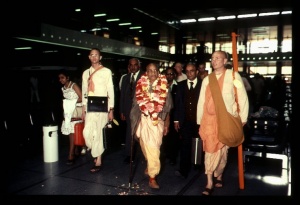SB 11.17.39

A.C. Bhaktivedanta Swami Prabhupada
Please note: The synonyms, translation and purport of this verse were composed by disciples of Śrīla Prabhupāda
TEXT 39
- gṛhārthī sadṛśīṁ bhāryām
- udvahed ajugupsitām
- yavīyasīṁ tu vayasā
- yaṁ sa-varṇām anu kramāt
SYNONYMS
gṛha — household; arthī — one who desires; sadṛśīm — possessing similar characteristics; bhāryām — a wife; udvahet — one should marry; ajugupsitām — beyond reproach; yavīyasīm — younger; tu — indeed; vayasā — by age; yām — another wife; sa-varṇām — the first wife who is of the same caste; anu — after; kramāt — in succession.
Translation and purport composed by disciples of Śrīla Prabhupāda
TRANSLATION
One who desires to establish family life should marry a wife of his own caste, who is beyond reproach and younger in age. If one desires to accept many wives he must marry them after the first marriage, and each wife should be of a successively lower caste.
PURPORT
As stated in the Vedic literature,
- tisro varṇānupūrvyeṇa
- dve tathaikā yathā-kramam
- brāhmaṇa-kṣatriya-viśāṁ
- bhāryāḥ svāḥ śūdra-janmanaḥ
The purport of this verse is that one's first wife must always be sadṛśīm, or similar to oneself. In other words, an intellectual man should marry an intellectual wife, a heroic man should marry a heroic wife, a business minded man should marry a woman who can encourage him in such activities, and a śūdra should marry a less intelligent woman. The wife must be beyond reproach in terms of her background and character and should always be younger than oneself, ideally five to ten years younger. If one desires to marry a second wife, then, as stated in this verse by the word varṇānupūrvyeṇa and in the verse spoken by Lord Kṛṣṇa by the word anukramāt, one must wait until the first marriage is established and then select a second wife from the next-lower caste. If one marries a third time the wife must be, again, from the next-lower caste. For example, a brāhmaṇa's first wife will be a brāhmaṇī, his second wife will be from the kṣatriya community, his third wife from the vaiśya community and fourth wife from the śūdra community. A kṣatriya may first marry a kṣatriya lady and then vaiśya and śūdra ladies. A vaiśya can accept wives from two classes, and a śūdra will accept a wife only from the śūdra class. By this progression of marriages there will be relative peace in the family. These Vedic marriage injunctions, as mentioned in the previous verse, are especially for those who are not pure devotees of the Lord.